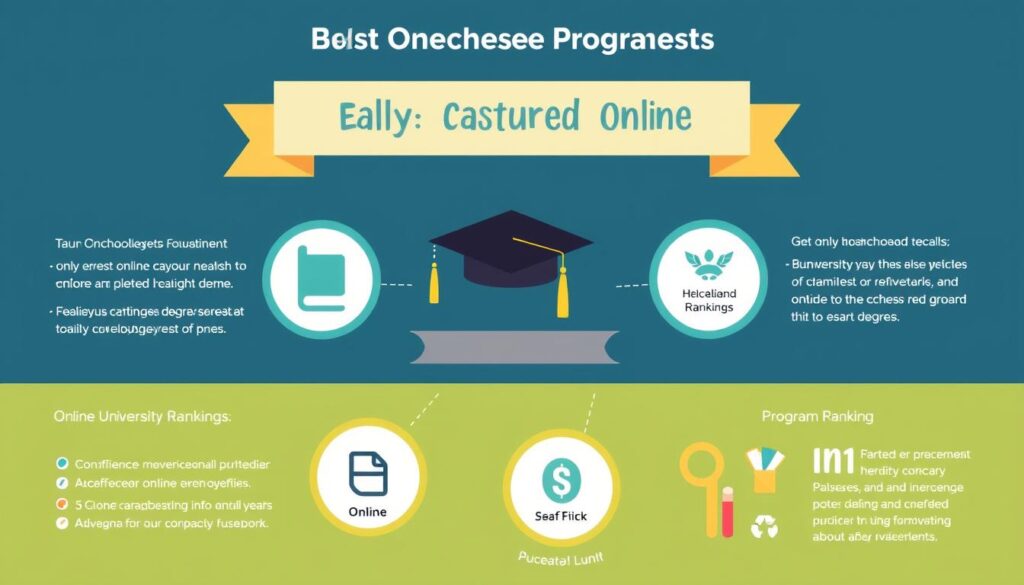Imagine being able to shape young minds and inspire a love of learning in children during their most formative years. Pursuing an online early childhood education degree can be the first step towards a rewarding career in teaching, childcare administration, or related fields.
With online programs offered by reputable institutions like the University of Florida and Penn Foster, you can gain the knowledge and skills needed to succeed. These programs combine theoretical foundations with practical experience, preparing you to make a meaningful impact on children’s lives.
By choosing to pursue your degree online, you can enjoy the flexibility and accessibility that online education provides, allowing you to balance your studies with work and family commitments.
Table of Contents:
- The Value of Early Childhood Education in Today’s World
- What Is an Online Early Childhood Education Degree?
- Benefits of Earning Your Early Childhood Education Degree Online
- Core Curriculum in Early Childhood Education Programs
- Field Experience and Practical Training Requirements
- Admission Requirements for Online Early Childhood Education Programs
- Tuition, Financial Aid, and Scholarship Opportunities
- Career Opportunities with an Early Childhood Education Degree
- Licensing and Certification Requirements
- Choosing the Right Online Early Childhood Education Program
- Taking the First Step Toward Your Early Childhood Education Career
The Value of Early Childhood Education in Today’s World
Early childhood education plays a vital role in shaping the minds of future generations. It lays the groundwork for future academic success and fosters essential skills that benefit children throughout their lives.
Impact on Child Development and Learning
High-quality early childhood education has a profound impact on child development. It enhances cognitive abilities, promotes social-emotional learning, and encourages curiosity and creativity. By focusing on these critical areas, early childhood educators can significantly influence a child’s ability to learn and grow.
Growing Demand for Qualified Early Childhood Educators
The demand for qualified early childhood educators is on the rise. According to the Bureau of Labor Statistics, employment of preschool teachers is projected to grow 7% over the next decade. This growth is driven by increased investment in programs and a greater emphasis on early learning, creating new career opportunities for those with specialized education.
- Increased recognition of early childhood education’s importance is leading to higher demand for qualified professionals.
- Job prospects are favorable for specialists prepared by Early Childhood Education degrees, with opportunities in both public and private settings.
- Policy changes and a focus on early learning have created new positions and career advancement opportunities.
What Is an Online Early Childhood Education Degree?

An online early childhood education degree offers a flexible pathway to becoming a qualified educator in early childhood settings. This degree program is designed to equip students with the knowledge, skills, and practices necessary for teaching and caring for young children.
Bachelor’s vs. Associate Degree Options
When considering an online early childhood education degree, students often have to decide between pursuing an associate or bachelor’s degree. An associate degree typically takes two years to complete and provides foundational knowledge in early childhood education. A bachelor’s degree, on the other hand, is a four-year program that offers more in-depth study and often leads to greater career advancement opportunities.
Accreditation and Program Quality
The quality of an early childhood education program is significantly influenced by its accreditation status. Accrediting bodies such as the Council for Accreditation of Teacher Preparation (CAEP) and the National Association for the Education of Young Children (NAEYC) ensure that programs meet rigorous standards. For instance, the University of Florida’s online early childhood education program is approved by the Florida Department of Education (FLDOE) and CAEP, while the University of Alabama’s program is accredited by NAEYC. When selecting a program, it’s crucial to verify its accreditation to ensure it meets industry standards.
- Learn why accreditation matters when choosing an online early childhood education program.
- Understand the role of accrediting bodies like CAEP and NAEYC.
- Discover how accredited programs prepare you for certification and employment.
Benefits of Earning Your Early Childhood Education Degree Online
Earning an early childhood education degree online provides students with a convenient and effective path to a rewarding career. This mode of education offers several benefits that cater to the diverse needs of students.
Flexibility for Working Professionals
Online early childhood education programs are designed to accommodate the schedules of working professionals. Flexibility is a key advantage, allowing students to balance their studies with work and other responsibilities.
Self-Paced Learning Opportunities
These programs also offer self-paced learning opportunities, enabling students to progress through coursework at their own speed. This aspect is particularly beneficial for those who require more time to grasp certain concepts.
Same Quality Education as On-Campus Programs
Online programs like UF Online offer the same dedicated faculty and rigor as on-campus programs. Graduates earn the same elite degree they would receive on campus, with no distinction made between online and on-campus education on the diploma. Some key aspects of online programs include:
- Accredited online early childhood education programs maintaining the same academic standards as their on-campus counterparts.
- Online programs being developed and taught by the same qualified faculty who teach on-campus courses.
- Digital learning platforms incorporating interactive elements and multimedia resources, enhancing the experience.

Core Curriculum in Early Childhood Education Programs
To become effective early childhood educators, students must complete a core curriculum that covers various aspects of child development and education. This comprehensive curriculum is designed to equip educators with the knowledge and skills necessary to support young children‘s development.
Child Development and Psychology Courses
Child development and psychology courses provide a foundational understanding of how children grow and learn. These courses cover developmental milestones, learning theories, and the psychological factors that influence children’s behavior and academic performance.
Curriculum Planning and Implementation
Curriculum planning and implementation courses teach educators how to design and deliver high-quality educational programs. These courses focus on creating engaging lesson plans, assessing children’s progress, and adapting instruction to meet diverse learning needs.

Special Education and Inclusive Classroom Strategies
Special education and inclusive classroom strategies are critical components of early childhood education programs. These courses prepare educators to support children with special needs, including those with disabilities or developmental delays. By learning how to create inclusive environments, educators can promote acceptance, empathy, and appreciation for diversity among all children, supporting the development of children from diverse backgrounds and fostering strong relationships with their families.
Field Experience and Practical Training Requirements

Gaining practical experience is a crucial component of any early childhood education program. Field experience provides students with the opportunity to apply theoretical knowledge in real-world settings, enhancing their understanding of child development and education principles.
Observation Hours and Classroom Practice
As part of their field experience, students are typically required to complete a certain number of observation hours and participate in classroom practice. This hands-on training helps them develop essential skills in lesson planning, classroom management, and child interaction. Many programs, such as those partnered with Penn Foster, Bright Horizons Family Solutions, and Learning Care Group, ensure that students are placed in high-quality early childhood education centers.
Finding Placement Opportunities Near You
Finding the right placement for field experience can be straightforward, thanks to partnerships between educational institutions and early childhood centers. Students can often complete their field experience at the same approved facility or find a new site each semester. It’s essential to check with your program to understand the specific requirements and available opportunities. Some programs may also allow you to leverage existing connections if you’re already working in an early childhood setting.
Admission Requirements for Online Early Childhood Education Programs

The journey to becoming an early childhood educator starts with navigating the admission requirements for online programs. Understanding these requirements is crucial for a successful application.
Academic Prerequisites
Academic prerequisites are a critical component of the admission process. Typically, applicants need a high school diploma or equivalent. Some programs may also require specific coursework in areas like child development or education.
Transfer Credits and Prior Learning Assessment
Many online early childhood education programs allow students to transfer credits or receive credit for prior learning. This can significantly reduce the time and cost associated with completing the program.
Application Process and Deadlines
The application process involves submitting transcripts, and sometimes standardized test scores like SAT, ACT, or GRE. Application deadlines vary by institution; some programs accept applications year-round, while others have specific cutoff dates. It’s essential to check with each program for their specific requirements and deadlines.
By understanding the admission requirements, including academic prerequisites, transfer credits, and application deadlines, prospective students can better navigate the process of applying to online early childhood education programs.
Tuition, Financial Aid, and Scholarship Opportunities

Financing your education is a critical step in pursuing an online Early Childhood Education degree. With the rising demand for early childhood educators, various financial aid options and scholarships are available to support students in achieving their educational goals.
Program Costs and Payment Options
The cost of an online Early Childhood Education program can vary based on the institution, location, and degree level. Understanding the tuition fees and payment options is essential for planning your educational expenses. Many institutions offer flexible payment plans to help manage costs.
Federal and State Financial Aid
Students pursuing an online Early Childhood Education degree may be eligible for federal and state financial aid. Completing the Free Application for Federal Student Aid (FAFSA) is a crucial step in determining your eligibility for grants, loans, and work-study programs.
Scholarships for Early Childhood Education Students
Several scholarship opportunities are available for students in Early Childhood Education programs. These include:– The TEACH Early Childhood Scholarship for individuals working in early learning and childcare programs.– Scholarships offered by professional organizations like the National Association for the Education of Young Children (NAEYC).– Institution-specific scholarships that may be merit-based or need-based.– State-specific programs such as Florida’s Para to Teacher Tuition Support Program.
To increase your chances of receiving a scholarship, it’s essential to create a compelling application that highlights your commitment to early childhood education.
Career Opportunities with an Early Childhood Education Degree

The field of early childhood education offers diverse career opportunities for those passionate about child development. With a degree in this field, individuals can explore various career paths that contribute to the growth and development of young children.
Preschool and Kindergarten Teaching Positions
Graduates can pursue teaching positions in preschools and kindergartens, where they play a crucial role in laying the foundation for children’s educational journeys. According to the Bureau of Labor Statistics, preschool teachers can earn a national average salary of $37,130 per year.
Childcare Administration Roles
For those interested in administration, childcare centers and educational institutions offer roles that involve managing programs, staff, and facilities. Experience and additional qualifications can lead to higher-paying administrative positions.
Salary Expectations and Job Outlook
The job outlook for early childhood educators is positive, with a projected growth of 7% over the next decade. Factors such as geographic location, work setting, education level, and years of experience impact earning potential. Obtaining additional credentials or specializations can enhance marketability and salary prospects.
Licensing and Certification Requirements

To work in early childhood education, understanding the licensing and certification requirements is essential. These requirements vary by state and employer, but they are crucial for ensuring that educators have the necessary knowledge and experience to provide high-quality care and education.
State-Specific Teaching Credentials
Teaching credentials for early childhood educators are often state-specific, meaning that the requirements for certification can differ significantly depending on where you plan to work. It’s essential to research the specific requirements for your state, including any necessary degrees, exams, or background checks.
Some states may require a bachelor’s degree in early childhood education or a related field, while others may have different requirements. Understanding these requirements is crucial for planning your education and career path.
Child Development Associate (CDA) Credential
The Child Development Associate (CDA) Credential is a nationally recognized credential that demonstrates your competence in working with young children. To earn a CDA, you must meet specific requirements, including completing a certain number of hours in education and experience, preparing a professional portfolio, and passing an assessment.
- Learn about the CDA credential and its benefits for early childhood educators.
- Understand the requirements for earning a CDA, including education, experience, and assessment components.
- Discover how many early childhood education degree programs, like Penn Foster’s Early Childhood Education Associate Degree, fulfill the educational requirements for the CDA credential.
Choosing the Right Online Early Childhood Education Program

With numerous online early childhood education programs available, choosing the right one requires careful consideration of various factors. As you explore your options, it’s essential to evaluate each program based on specific criteria to ensure you find the best fit for your career goals.
Factors to Consider When Selecting a Program
When selecting an online early childhood education program, several factors come into play. Accreditation is crucial, as it ensures the program meets certain standards. You should also consider the program’s curriculum, faculty expertise, and field experience opportunities. Additionally, think about the level of support provided to online students, including academic advising and technical support.
Questions to Ask Admissions Counselors
To make an informed decision, it’s vital to ask the right questions when speaking with admissions counselors. Some key questions include:– What is the program’s accreditation status?– How does the program prepare students for state licensure?– What are the field experience requirements, and how are placements secured?– What support services are available to online students?– What are the program’s completion rates and job placement statistics?
By asking these questions, you can gain a better understanding of the program’s quality and how it can support your career aspirations in early childhood education.
Taking the First Step Toward Your Early Childhood Education Career
Taking the first step towards a career in early childhood education involves researching and applying to online degree programs. To start, it’s essential to understand the practical first steps to begin your journey toward an early childhood education degree, from researching programs to submitting your application.
Creating a realistic timeline for your education is crucial, taking into account application deadlines, program start dates, and your personal circumstances. Additionally, preparing financially for your education by exploring financial aid options, creating a budget, and applying for scholarships well in advance is vital.
- Mentally prepare for online learning by assessing your technology needs and creating a dedicated study space.
- Develop time management strategies to ensure success in your studies.
- Connect with current students or alumni to gain valuable insights and feel confident in your decision.
By investing in your education, you’ll be able to make a lasting difference in the development and future success of young children for years to come. Throughout your educational journey, you’ll experience personal and professional growth as you develop the knowledge, skills, and dispositions of an effective early childhood educator.

